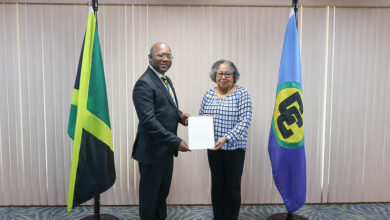Salutations
I greet you on behalf of the Secretary-General of the Caribbean Community.
Today is a great day for Technical and Vocational Education and Training (TVET) in our region and it is therefore for me, a great pleasure and privilege to bring you brief remarks on behalf of the CARICOM Secretariat on the occasion of the launch of the Caribbean Vocational Qualification here in Jamaica.
Permit me to elaborate briefly on the context within which this significant event is taking place. Our Heads of Government in Grand Anse, Grenada in 1989 took a decision to deepen the integration movement in the region through the establishment of the CARICOM Single Market and Economy, the CSME and it was quite a long road to the establishment of the Single Market in January of 2006.
At that time of the Grand Anse decision, our Heads of Government recognised the deepening of the integration process as critical to the Community’s ability to respond to the challenges and opportunities presented by the changes in the global economy and reiterated that the goal of our regional integration process was, first and foremost, to enhance the well-being of all of the citizens of our Community.
As you are aware, one of the main pillars of the CSME is the free movement of skilled persons throughout the Region and the region has adopted a phased approach to the free movement of skills, designating specific categories of wage earners to be accorded this right. Even as this regime was put in place, The Conference of Heads of Government was acutely aware of the perception that not all categories of workers had an equal chance of becoming eligible and benefiting from the CSME and urged that modalities for facilitating the movement of other categories, for example non-graduate teachers and nurses and artisans be put in place to facilitate their free movement.
The Conference, in July 2007 agreed to the free movement of teachers and nurses and at that time, also agreed, in principle, to include artisans as soon as the modalities for facilitating their movement were finalised. In July of this year, the Conference mandated the Council for Human and Social Development (COHSOD) to approve at its next meeting, the categories which must become eligible for free movement in 2007, in order to ensure that the free movement of these categories can be operationalised. The COHSOD met on October 10–12, was satisfied with the arrangements that had been put in place for the CVQ and recommended, inter alia, the movement of
• Persons certified with the CVQ at all levels in areas for which regional standards have been approved,
• Persons certified with National Vocational Qualifications from January 2004 in areas for which regional standards have been approved
We can therefore expect to learn very shortly of the agreed date for the commencement of free movement of these categories of persons.
Functional Cooperation
The road to the development of CVQs is one which exemplified the benefits of functional cooperation, identified in the Revised Treaty of Chaguaramas, as one of the important pillars on which our regional integration process rests.
The imperative of positioning the Region for competitive participation in the New Economy highlighted the importance of Human Resource Development in all its facets and in particular, underlined the importance of reorganizing TVET in the Region to provide skill development which was in line with the workplace demands. The CARICOM Regional Strategy for TVET provided the Framework for this re-orientation of our systems to a demand-led competency based system of training and certification. The HEART Trust/ NTA was first out of the starting blocks with regard to the development of such a system, resulting in the National Vocational Qualification of Jamaica, the NVQ-J.
However, the operation of the Single Market and Economy demanded in addition, a common system and understanding across the Region, of quality assurance issues at all levels of Education and Training, and portable qualifications especially in TVET. The fact that we can now move from National Vocational Qualifications to a regional Vocational Qualification is testimony to the political will and hard work invested in the process by our Member States.
Today, the HEART Trust/NTA and the National Council for Technical and Vocational Education and Training (NCTVET) can feel justifiably proud of the leadership role played in bringing the Region to this point, and it is fitting therefore, that the first launch of the CVQ by a Training Agency should take place in Jamaica. Many of us here can recall the evangelistic zeal with which Mr. Robert Gregory, former CEO of HEART Trust, and Ms Paulette Dunn-Smith, Senior Director, NCTVET, moved throughout various regional fora over the past decade, selling the idea of competency based Vocational Qualifications, and later the CVQ. To them I say a hearty thank you. I am happy to note that Mr Gregory who has recently been recognised nationally for his contribution to TVET through the conferring of the Order of Distinction, Commander Class, will be sharing in a significant way in this event.
The Region continues to benefit from the advocacy and expertise which this Agency provides for the regional process and I wish to assure the new Executive Director, Mr Donald Foster and other members of the Technical Team at HEART Trust/NTA that that they are sincerely respected and appreciated for this.
Over the past decade, the Region has seen the establishment of several other Training Agencies, firstly, the National Training Agency of Trinidad and Tobago and the TVET Council in Barbados, and in the past two years, several others. The development of the Agencies in Trinidad and Tobago benefited significantly from the unselfish mentoring and technical assistance provided by HEART Trust/NTA. These two NTAs are now able to join with Jamaica in the context of the Caribbean Association of Training Agencies (CANTA) to provide similar support to the fledgling agencies across the Region, a shining example of functional cooperation.
The Caribbean Vocational Qualification is based on a documented Regional Process for Workforce Training, Assessment and Certification approved by COHSOD in October 2006, a process which has as its core the development of occupational standards. Based on collaboration among the Training Agencies, COHSOD has been able to approve standards in several occupational areas and it is expected that this list will be expanded shortly. It is on this basis therefore, that COHSOD was able to recommend the movement of persons holding NVQs from 2004, in specified areas as the first set of such standards was approved in 2003. This process of regional collaboration will continue and will be closely monitored to ensure the integrity of the qualification.
The CVQ has the potential to ensure that the CSME has available to it a regional pool of certified skilled persons and to touch lives as it puts the benefits of the CSME within reach of many given its availability to skilled, yet uncertified persons in workplaces, students in secondary schools, through arrangements with CXC, and persons in training institutions. The Region looks forward to reaping these benefits.
This launch would not have been possible without the contribution of several persons and institutions across the Region. I wish to place on record therefore, appreciation to the HEART Trust/NTA and NCTVET, all other National Training Agencies and TVET co-ordinating bodies in the Region, Ministries of Education, Labour and all other government ministries associated with the CVQ initiative, the Caribbean Examinations Council, training institutions, the many industry bodies across the Region which led the development of the occupational standards, the labour movement, and all others who advocated and worked to realise what we are witnessing today.
To the Ministry of Education Jamaica, the HEART Trust/NTA and NCTVET, I say congratulations!
To those who are with us today having satisfied the criteria for the award of the CVQ, you must be proud to be such an important part of this historic moment. I congratulate you.
The Region looks forward to continued support and collaboration as we seek to build the Community for All to which our Heads of Government re-committed themselves when, on the occasion of The Twenty-Eighth Meeting of The Conference, in Barbados, this year, they pledged in the Declaration on Functional Cooperation
‘to invest in functional cooperation for the further development of our region’s human and social capital, whose greatest dividend is the creation of a Community for All.’
I thank you.





